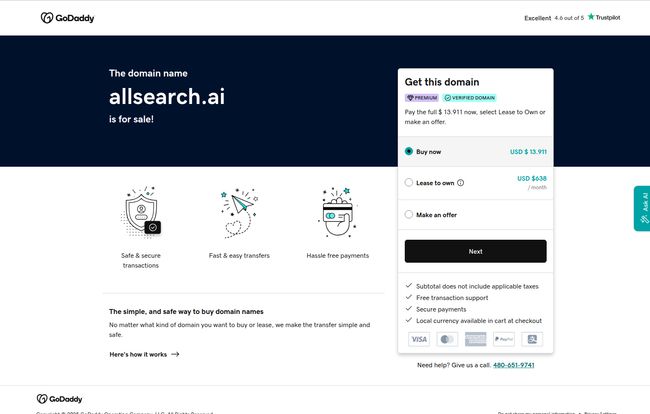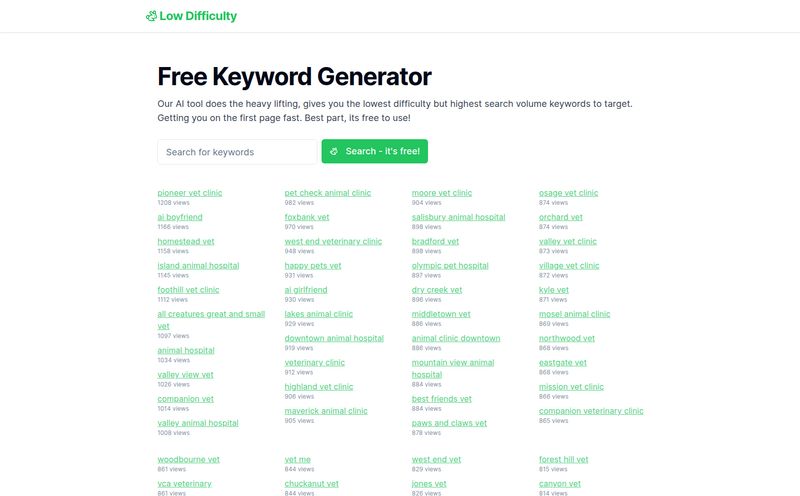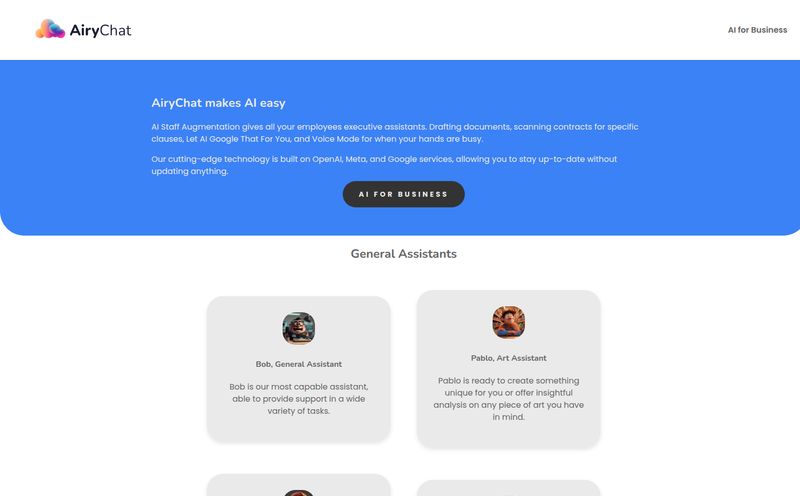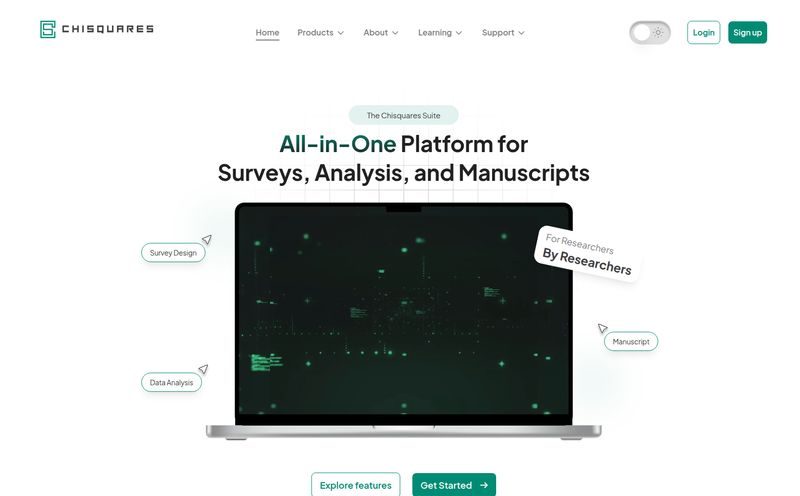Every so often in the SEO world, you stumble upon a tool that makes you stop and say, “Whoa. That’s exactly what I needed.” It promises to solve a problem you’ve been wrestling with for years. A few weeks ago, I had one of those moments when I heard whispers of a tool called AllSearch.ai. The premise was simple, yet brilliant: a search engine that doesn’t just scan the web, but the actual text inside thousands of books.
My mind immediately started racing. Think of the possibilities! Unearthing unique quotes for a blog post, finding historical data not yet digitized on a mainstream website, or just doing some seriously deep-dive research for a new client vertical. It sounded like a content creator’s dream. A secret weapon.
So, naturally, I eagerly typed `allsearch.ai` into my browser, credit card practically in hand, ready to sign up. And then… I was met with a GoDaddy landing page.
“The domain name allsearch.ai is for sale!”
Wait, what? For the low, low price of $13,911. Well, that wasn't what I was expecting. It felt like discovering a map to a lost city, only to find a parking lot where the treasure should be. So, what was AllSearch.ai, and where did it go? Let’s play detective.

Visit AllSearch.ai
The Ghost in the Machine: A Promising Idea
Before it became a pricey piece of digital real estate, AllSearch.ai was a concept with some serious potential. It wasn't just another search engine. It was poised to be a digital librarian, an academic researcher, and a creative partner all rolled into one. The idea of sifting through centuries of published knowledge with a few keystrokes is something many of us in the content and research fields have dreamed about.
We spend so much time trying to outrank each other using the same pool of online articles. A tool that opens up an entirely different reservoir of information? That’s not just an advantage; it’s a whole new ballgame.
What Was AllSearch.ai Supposed to Be?
Based on the digital breadcrumbs left behind, AllSearch.ai wasn’t just a simple keyword finder. It was designed with a suite of features that showed a real understanding of what researchers need.
A Digital Librarian at Your Fingertips
At its core, the platform was designed to let you search the full content of a massive library of books. This is a huge leap from just searching titles or summaries. Imagine you're writing an article about the history of coffee houses in London. Instead of just finding books about the topic, you could search for every mention of the phrase “Lloyd’s coffee house” in every book published between 1700 and 1800. The depth of insight you could get is just… staggering.
Fine-Tuning Your Literary Search
What really made the concept stand out were the adjustable parameters. It wasn't a one-size-fits-all search box. You could reportedly:
- Adjust the time span: Look for information only within specific publication years.
- Filter by genre: Isolate results to fiction, history, science, or whatever else you needed.
- Control the number of results: Avoid getting overwhelmed by a firehose of information.
- Tweak speed vs. quality: A fascinating feature. Need a quick-and-dirty result? Crank up the speed. Need the most comprehensive, deep-scan possible? Switch to high-quality mode.
This level of control is something that even giants like Google Books haven’t fully perfected in a user-friendly way. It shows the creators were thinking like power users.
The Dream vs. The Reality: Why a Tool Like This is a Game-Changer (And a Challenge)
It’s easy to see the appeal. But building a tool like AllSearch.ai is a monumental task. Let's break down the good and the, well, the probably very difficult.
The Upside: Unearthing Content Gold
For an SEO or content marketer, the benefits are obvious. You get access to a treasure trove of unique information that hasn't been re-hashed a million times in other blog posts. This is how you create truly authoritative, 10x content. You can find primary sources, forgotten statistics, and beautifully phrased quotes that make your articles sing. It’s the difference between building a house with prefab materials versus using hand-carved, unique timber. The end result is just richer and more durable.
The Inevitable Hurdles
On the flip side, the challenges are immense. First, you have the database itself. Acquiring the rights to scan and index thousands, if not millions, of books is a legal and logistical nightmare. I imagine the conversations around copyright alone would be enough to make anyone’s head spin. Then there's the quality. The search results are only as good as the books in the system. A database skewed towards one genre or time period would limit its usefulness.
And let's not forget the sheer technical lift. The processing power required to index and search the full text of countless books in real-time is enormous. It's a resource-intensive operation that likely requires some serious funding to maintain. Which brings us back to that GoDaddy page.
So, Where Did It Go? The $13,911 Question
This is where we enter the realm of speculation, my favorite pastime. When a promising startup’s domain goes up for sale, it’s usually for a few common reasons:
- The Money Ran Out: The most common story in Silicon Valley and beyond. They had a great idea, a working prototype maybe, but couldn’t secure the next round of funding to cover the massive operational costs.
- Acqui-hired or Asset Sale: It's possible a larger company (like Google, or a big data firm) bought the technology and the team but had no interest in the brand name itself, letting the domain expire.
- A Founder’s Pivot: The creator might have been a solo developer or small team that simply decided to move on to a different project. It happens. Life gets in the way.
- It Never Really Launched: Maybe AllSearch.ai was just a well-marketed concept, a 'coming soon' page that never came to be. They secured the domain, laid out the vision, and it just never got off the ground.
Whatever the reason, it's a bit of a shame. The internet is full of tools that do similar things, but the unique combination of features promised by AllSearch.ai felt… different. It felt special.
Are There Alternatives to the AllSearch.ai Dream?
So, we can’t buy AllSearch.ai (unless one of you has a spare $14k). What can we use in the meantime? The dream isn't completely dead.
- Google Books: It's the 800-pound gorilla in the room. It has an immense library and powerful search capabilities, including full-text search on many titles. It’s a fantastic resource, even if its interface can be a little clunky and the search filters aren't as granular as what AllSearch.ai promised.
- The Internet Archive: An absolute goldmine. Their Text Archive contains millions of free books, texts, and documents. It's a non-profit, so the scope is incredible, and it's fantastic for finding public domain works.
- Project Gutenberg: For older, public domain literary works, Project Gutenberg is an invaluable resource, though it's more of a library than a search engine.
These are all great, but they don’t quite capture that specific, tailored magic AllSearch.ai was shooting for. They're more like a sprawling public library, whereas AllSearch.ai wanted to be your personal, genius-level research assistant.
The Final Chapter on AllSearch.ai
The story of AllSearch.ai is a familiar one in the tech world. It’s a tale of big ambition and, for now, an uncertain ending. It serves as a reminder that a brilliant idea is only the first step in a very long, very expensive process. It’s a perfect example of a tool that so many of us would have loved to use, but that might have been just a little too difficult or costly to bring to life.
Will someone buy the domain and resurrect the project? Or will it remain a digital ghost, a legend whispered among content creators? I, for one, am holding out a little hope. In a world saturated with the same-old online content, a key to the world’s libraries is a treasure worth fighting for.
Frequently Asked Questions about AllSearch.ai
- What was AllSearch.ai?
- AllSearch.ai was the concept for a specialized search engine designed to allow users to search the full text inside thousands of books, with advanced filters for time period, genre, and result quality.
- Is AllSearch.ai still available?
- No. As of late 2024/early 2025, the domain name `allsearch.ai` is listed for sale on GoDaddy, indicating the service is not active. It's current price is quite high.
- Why would a book search engine be useful for SEO?
- It would allow content creators to find unique data, primary sources, and expert quotes that are not readily available on the web. This helps in creating more authoritative, original, and high-ranking content that stands out from competitors.
- What was the main selling point of AllSearch.ai?
- Its key differentiator was the promise of highly customizable search parameters. Users could fine-tune their search by date, genre, and even a unique slider to balance search speed against the comprehensiveness of the results.
- What are the best alternatives to AllSearch.ai?
- The best and most powerful alternatives currently available are Google Books and the Text Archive at The Internet Archive. Both offer massive libraries and full-text search capabilities, although without the specific filtering controls AllSearch.ai was designed to have.
- Could AllSearch.ai ever come back?
- It's possible. Someone could purchase the domain and develop the tool, or the original creators could re-acquire it. However, for now, it should be considered a defunct project.



